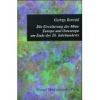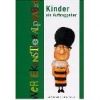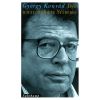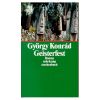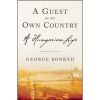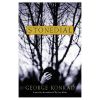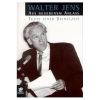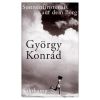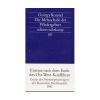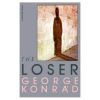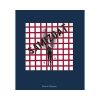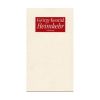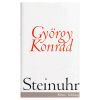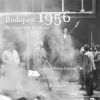Legfrissebb kiadás

|
Falevelek a szélben Magvető kiadó, 2017 |
Experimental Novel of Hungary's Trek to Freedom (Books of The Times, Herbert Mitgang, May 13, 1992 )
Kapcsolódó könyv:
A feast in the garden - Harcourt Brace Jovanovich, 1992
A feast in the garden - Harcourt Brace Jovanovich, 1992
A Feast in the Garden By George Konrad Translated by Imre Goldstein. 394 pages. A Helen and Kurt Wolff Book/Harcourt Brace Jovanovich. $23.95.
In "A Feast in the Garden," an experimental novel that is alternately scintillating and exasperating, George Konrad continues to describe Central Europe emerging from the ashes of war and tyranny. Once again the distinguished Hungarian writer filters the story through his own personality, as he did so pointedly in his first novel, "The Case Worker." But his demanding new novel is written in a nonlinear style that forces the reader to indulge the author's throat-clearing and backing and filling while waiting and hoping for something to happen between the train stops of his narrative.
Although "A Feast in the Garden" is self-conscious and frequently stumbles under the weight of dozens of characters, some of the scenes and personalities are vivid. In this lucid translation by Imre Goldstein from the Hungarian, the reader encounters the author's parents, grandparents, siblings, friends and neighbors as they perish or survive through two World Wars, the Holocaust, the cold war police state, the confusions of freedom and visits to America.
"I am writing my most hazardous book," Mr. Konrad declares in a half-warning without apology. "I have been sentenced to examine myself. To dissect myself in the morgue of my own conscience. To understand without resentment, without self-justification. To describe what hurts, even if that means going beyond the permissible. Writing is a never-ending transgression and border violation. No matter how far I venture, I am still too close. No matter how salty, I am still too sweet. The more preposterous literature is, the more relevant."
This sort of pause for station identification isn't the stuff of imaginative fiction. (In "Howards End," E. M. Forster put the storyteller's role more plainly: "Only connect!") With a writer as talented as Mr. Konrad, it's best for the reader to ignore the posturing, avoid taking the lecture about what is or isn't preposterous in literature too seriously, and press on.
Mr. Konrad creates a central character, David Kobra, 11 years old, who is clearly derived from his own experiences. The youth's world is shattered when the Jews in his family, trapped in a small town in Hungary, are put on trains to the death camps. But having captured our attention with an emblematic character living through the horror of the Holocaust, the novelist then retreats to the comfort of autobiography:
"My grandfather's name was Ignac Kohn. After graduating from high school, my father Hungarianized the name to Konrad. He had an uncle by that name in Debrecen, a Talmudic scholar and owner of a bookstore, who would sit up in the mezzanine of the store and read and not come down even when someone rang the bell below."
Mr. Konrad can be brilliantly ironic in describing the small details of survival and the effort to retain a semblance of pride during the German Occupation. He tells how his mother sewed the yellow Stars of David on the family's jackets:
"There had been homemade, clumsy stars, but private industry quickly responded to the need. It was a matter of public concern that there be regulation stars: canary yellow, machine-finished, 6-by-6 centimeters. The mass-produced stars had to be sewn on our outer garments with stitches close enough so that a pencil point could not be put between them. Because those wily Jews were capable of anything; they might wear a badge, and then, whenever the mood hit them, remove it."
The family awaits the inevitable knock on the door. When the Gestapo arrives, David's father puts on his English tweed jacket with the regulation yellow star. He is suspected of possessing a secret radio transmitter in his attic. When the Gestapo agents don't find one, they seize his money, jewelry and camera and march him off to the police station. His Hungarian neighbors ignore him as he walks through the streets. Later, David learns that his father was denounced by a pastry cook, a member of the Nazi-oriented Arrow-Cross group.
David's parents are deported to Austria, avoiding the death camps; he and his sister remain at home. After the war, they are the only intact Jewish family in their village. In one of the most heartfelt parts of the novel, the author writes: "As a child I decided -- and have kept to it ever since -- that everything that denies Auschwitz is good, and everything that leads to it, or resembles it, or revives it in some other form to be used against other victims is bad. My Jewish classmates, children, went up in flames there."
At this point Mr. Konrad steps out of his character's guise. "The gassing and burning of people came from ideas and books," he continues. "At age 11, I was an enemy. My spiritual and racial characteristics offended the protectors of the state's purity. I had to be removed, much as one removes a piece of garbage." Visiting Auschwitz in 1982, he remembers his pretty classmate, Vera, with her long blond braids, and muses: "She, too, went up in flames, and I am still here, more than 40 years later, writing this." Then, sarcastically: "But according to a French historian, Vera was not gassed, because there never were any gas chambers."
Had Mr. Konrad confined "A Feast in the Garden" to the Holocaust as the most bestial event of any civilized century, he would have written a more successful novel or a welcome undisguised autobiography. Instead, by interjecting himself between the lives of his characters and constantly changing the time frame, he has written a daring and, yes, hazardous book.
Although "A Feast in the Garden" is self-conscious and frequently stumbles under the weight of dozens of characters, some of the scenes and personalities are vivid. In this lucid translation by Imre Goldstein from the Hungarian, the reader encounters the author's parents, grandparents, siblings, friends and neighbors as they perish or survive through two World Wars, the Holocaust, the cold war police state, the confusions of freedom and visits to America.
"I am writing my most hazardous book," Mr. Konrad declares in a half-warning without apology. "I have been sentenced to examine myself. To dissect myself in the morgue of my own conscience. To understand without resentment, without self-justification. To describe what hurts, even if that means going beyond the permissible. Writing is a never-ending transgression and border violation. No matter how far I venture, I am still too close. No matter how salty, I am still too sweet. The more preposterous literature is, the more relevant."
This sort of pause for station identification isn't the stuff of imaginative fiction. (In "Howards End," E. M. Forster put the storyteller's role more plainly: "Only connect!") With a writer as talented as Mr. Konrad, it's best for the reader to ignore the posturing, avoid taking the lecture about what is or isn't preposterous in literature too seriously, and press on.
Mr. Konrad creates a central character, David Kobra, 11 years old, who is clearly derived from his own experiences. The youth's world is shattered when the Jews in his family, trapped in a small town in Hungary, are put on trains to the death camps. But having captured our attention with an emblematic character living through the horror of the Holocaust, the novelist then retreats to the comfort of autobiography:
"My grandfather's name was Ignac Kohn. After graduating from high school, my father Hungarianized the name to Konrad. He had an uncle by that name in Debrecen, a Talmudic scholar and owner of a bookstore, who would sit up in the mezzanine of the store and read and not come down even when someone rang the bell below."
Mr. Konrad can be brilliantly ironic in describing the small details of survival and the effort to retain a semblance of pride during the German Occupation. He tells how his mother sewed the yellow Stars of David on the family's jackets:
"There had been homemade, clumsy stars, but private industry quickly responded to the need. It was a matter of public concern that there be regulation stars: canary yellow, machine-finished, 6-by-6 centimeters. The mass-produced stars had to be sewn on our outer garments with stitches close enough so that a pencil point could not be put between them. Because those wily Jews were capable of anything; they might wear a badge, and then, whenever the mood hit them, remove it."
The family awaits the inevitable knock on the door. When the Gestapo arrives, David's father puts on his English tweed jacket with the regulation yellow star. He is suspected of possessing a secret radio transmitter in his attic. When the Gestapo agents don't find one, they seize his money, jewelry and camera and march him off to the police station. His Hungarian neighbors ignore him as he walks through the streets. Later, David learns that his father was denounced by a pastry cook, a member of the Nazi-oriented Arrow-Cross group.
David's parents are deported to Austria, avoiding the death camps; he and his sister remain at home. After the war, they are the only intact Jewish family in their village. In one of the most heartfelt parts of the novel, the author writes: "As a child I decided -- and have kept to it ever since -- that everything that denies Auschwitz is good, and everything that leads to it, or resembles it, or revives it in some other form to be used against other victims is bad. My Jewish classmates, children, went up in flames there."
At this point Mr. Konrad steps out of his character's guise. "The gassing and burning of people came from ideas and books," he continues. "At age 11, I was an enemy. My spiritual and racial characteristics offended the protectors of the state's purity. I had to be removed, much as one removes a piece of garbage." Visiting Auschwitz in 1982, he remembers his pretty classmate, Vera, with her long blond braids, and muses: "She, too, went up in flames, and I am still here, more than 40 years later, writing this." Then, sarcastically: "But according to a French historian, Vera was not gassed, because there never were any gas chambers."
Had Mr. Konrad confined "A Feast in the Garden" to the Holocaust as the most bestial event of any civilized century, he would have written a more successful novel or a welcome undisguised autobiography. Instead, by interjecting himself between the lives of his characters and constantly changing the time frame, he has written a daring and, yes, hazardous book.






